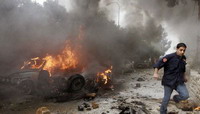Explosion in south Lebanon takes 5 lives while in north 10 lives in fighting
A car bomb explosion killed five U.N. peacekeepers patrolling a southern Lebanon road Sunday. Up north, Lebanese troops engaged in another battle with Islamic militants in Tripoli that claimed 10 more lives.

The mounting violence across Lebanon reflected the fast growing instability that is certain to throw the country into further chaos.
The deadly attack against the peacekeepers marked the first time that the U.N. Interim Force in Lebanon, known as UNIFIL, has come under attack since it was reinforced last summer after the war between Hezbollah guerrillas and Israeli forces in Lebanon.
In Madrid, Spanish Defense Minister Jose Antonio Alonso said three Colombian and two Spanish peacekeepers were killed, and three Spaniards were wounded. He called it a "premeditated attack" and said the "most likely cause" was either a car bomb or device activated by remote control.
Lebanese officials said it appeared the explosion was triggered by remote control. No body parts were found in the car, meaning the bomb was detonated from a distance and did not involve a suicide attacker.
UNIFIL confirmed the explosion and said in a statement it suspected that the blast was caused by an explosive device.
The blast caused fires and threw the troops' armored personnel carrier to the side of a main road between the towns of Marjayoun and Khiam, a few kilometers (miles) north of the Israeli town of Metulla. Investigators worked under floodlights late Sunday at the scene to determine what happened.
Spain has 1,100 peacekeepers in Lebanon that are part of the 13,000-member U.N. force from 30 countries. UNIFIL, along with 15,000 Lebanese troops, patrol a zone along the Lebanese-Israeli border.
UNIFIL's presence is instrumental in giving international teeth to the U.N. cease-fire resolution that halted last summer's 34-day war. The reinforced UNIFIL force had received assurance regarding the safety of its troops and such attacks like Sunday's could weaken the resolve of contributing countries. It also could have serious repercussions for peace along the border.
Western-backed Lebanese Prime Minister Fuad Saniora denounced the "suspicious terrorist attack," saying "it targets Lebanon's security and stability."
Hezbollah also was quick to denounce the attack, calling it in a statement a "suspicious act that harms the people of the south and of Lebanon." The militant has had good relations with UNIFIL since the troops were first deployed in Lebanon in 1978.
Israel expressed "deep sorrow" at the deaths and offered assistance "in any way required," said Foreign Ministry spokesman Mark Regev. At a news conference in Paris, U.S. Secretary of State Condoleezza Rice and French Foreign Minister Bernard Kouchner also condemned the attack.
There have been warnings that the peacekeepers could be hit by a terror attack, particularly from al-Qaida and its sympathizers. Media reports earlier this month said interrogations by Lebanese authorities with captured militants revealed plots to attack the force.
Those warnings became more serious after the al-Qaida-inspired Islamic militant group Fatah Islam began fighting Lebanese troops in a northern Lebanon Palestinian refugee camp five weeks ago. The militants have threatened to expand their battle to other parts of Lebanon.
Al-Qaida's No. 2 Ayman al-Zawahri, in videos broadcast in September, also has denounced the reinforced UNIFIL.
The attack comes as the U.N. has become increasingly involved in highly divisive issues in Lebanon, including its relations with neighboring Syria. Last month, the U.N. Security Council imposed an international tribunal to try suspects in the 2005 assassination of former Lebanese Premier Rafik Hariri despite rejection from the country's Hezbollah-led opposition, which supports Damascus' involvement in Lebanon.
Over the past three years, the U.N. has issued resolutions calling on Syria to stop interfering in Lebanese affairs and had considered a mission to monitor the border with Syria.
As part of security precautions, U.N. staff in Beirut in recent days erected a four meter-high (13 feet) blast wall around the building housing U.N. offices.
Southern Lebanon has been largely quiet after the summer war that killed more than 1,200 people, most of them in Lebanon. However, rockets were fired on Israel a week ago, causing damage but no casualties in an attack that was blamed on radical Palestinians or sympathizers with Fatah Islam.
Up north in the port city of Tripoli, Lebanese troops on Sunday raided an apartment complex suspected of housing Islamic militants, sparking a gunbattle that left 10 people dead, including six gunmen, security officials said.
An army soldier, a policeman and two family members were also killed in the fighting, which began when troops seized a building where militants had taken refuge after nighttime clashes.
Six of the Islamic militants were also killed, including three Saudi nationals, one ethnic Chechen and two Lebanese who also held foreign passports, said the officials, who spoke on condition of anonymity because they were not authorized to speak to the media.
The battle shifted the fighting from the bombed out Nahr el-Bared back to nearby Tripoli where violence first erupted May 20 and underlined the immense challenges facing the army as it battles al-Qaida-inspired militants.
The Nahr el-Bared fighting, Lebanon's worst internal violence since the 1975-90 civil war, has killed 80 soldiers and wounded more than 150. The fighting has claimed the lives of at least 60 militants and more than 20 civilians.
Subscribe to Pravda.Ru Telegram channel, Facebook, RSS!




